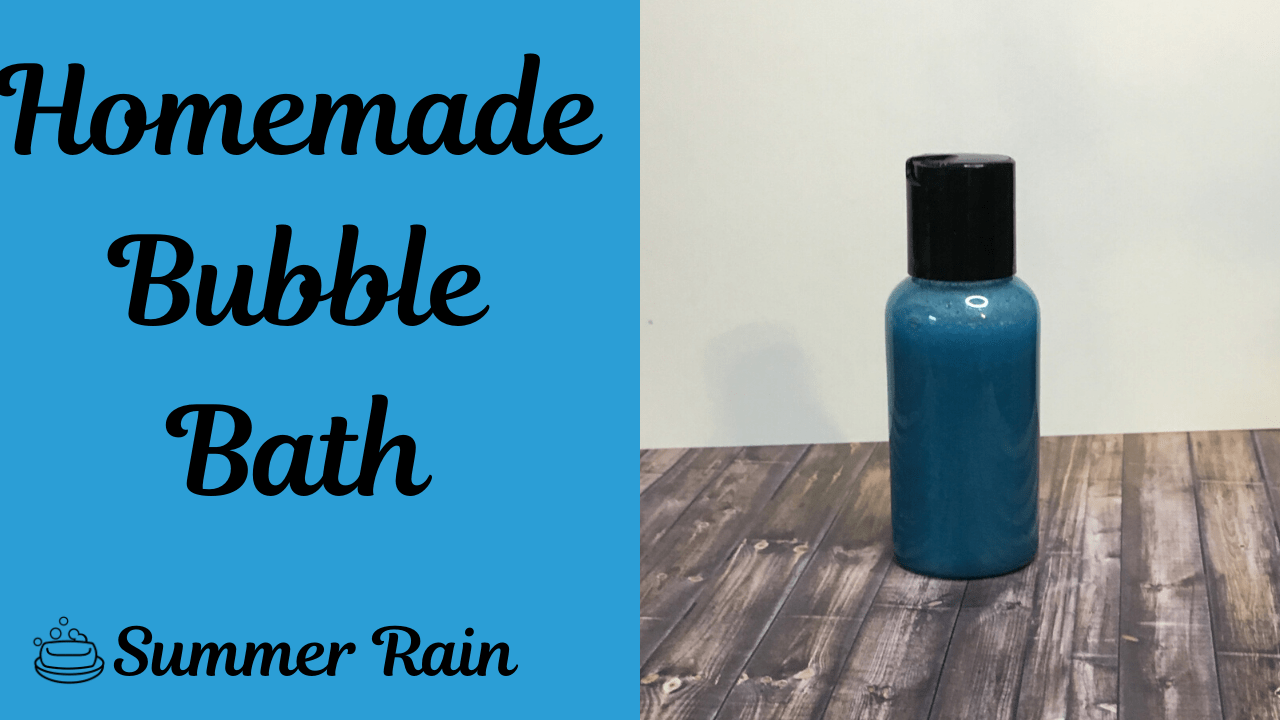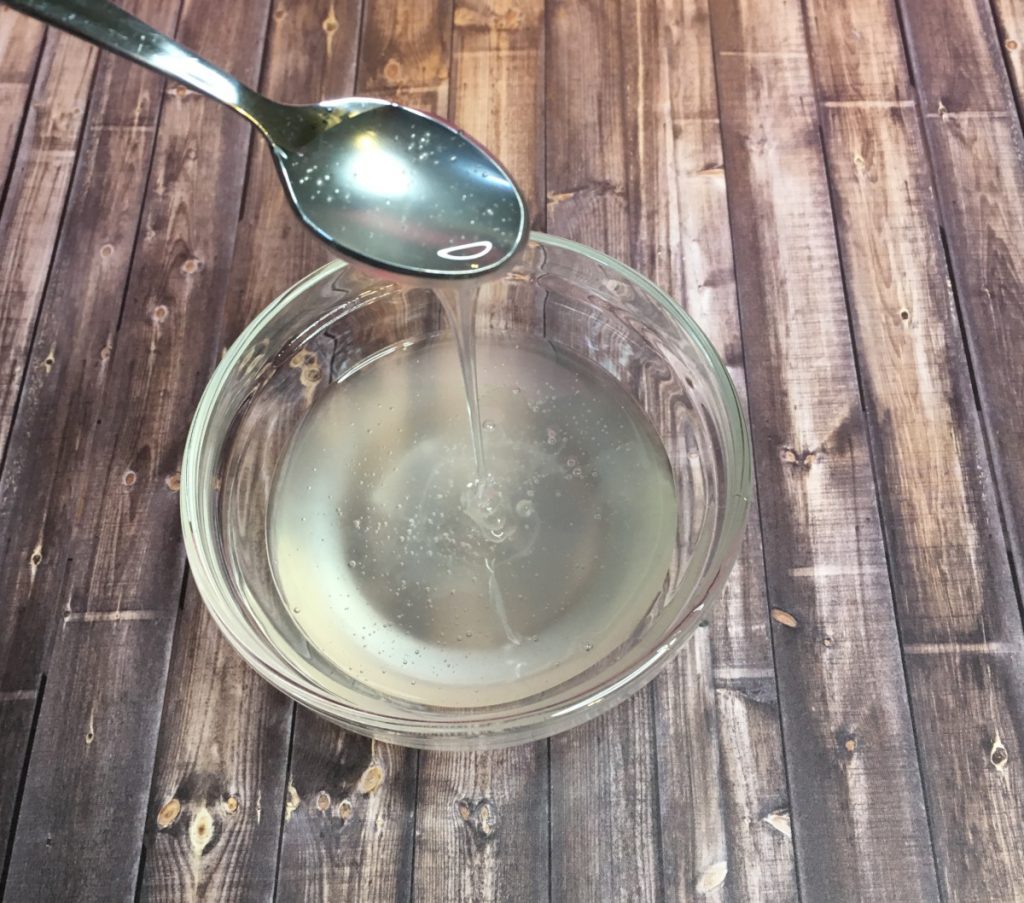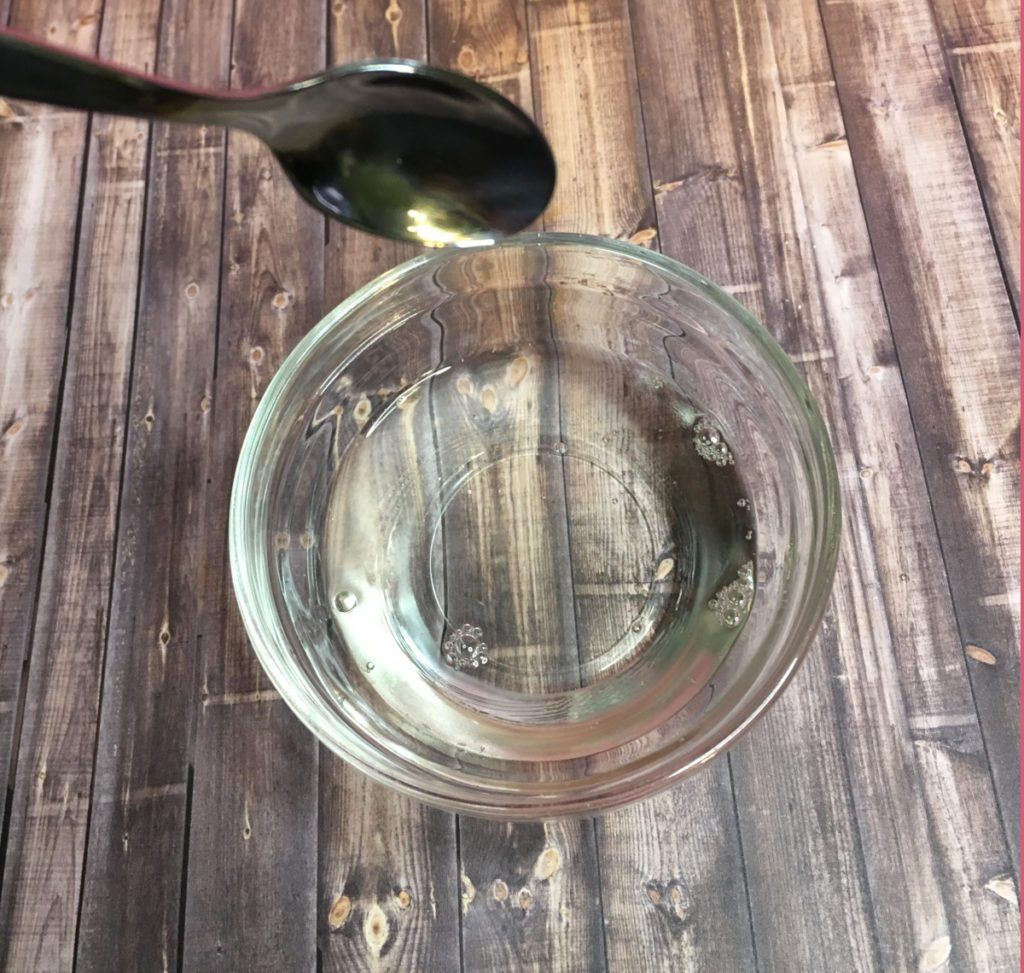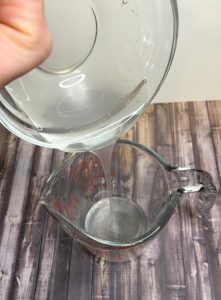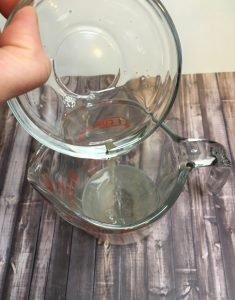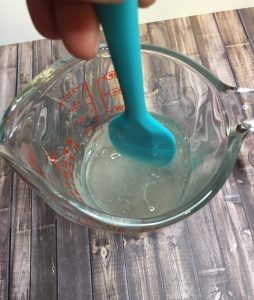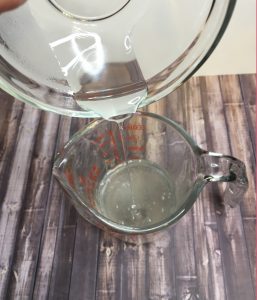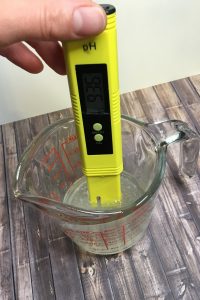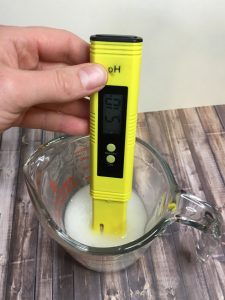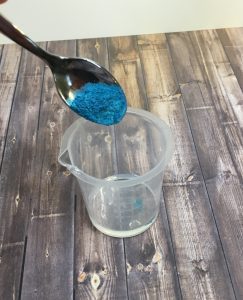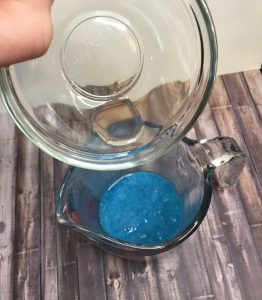There is nothing better than a nice hot bath, well except a nice hot bubble bath! In this post, I will show you how to make liquid bubble bath right at home. In this post I will teach you step by step how to make the bubble bath, about the ingredients and why we use them and give you a full recipe that you can make at home.
Table of Contents
Prefer to watch this project instead of reading it?
Annnndddd, you still have time to make your own bubble bath and Celebrate National Bubble Bath Day!! (Which is January 8th, in case you forgot!)
Making Big Bubbles
So let’s talk about something that it feels silly to mention, but I am going to mention it anyway. To get the best bubble from any bubble bath, you need to add it to the tub after there are a few inches of water in the tub. Then you will want to slowly pour the bubble bath directly under the faucet.
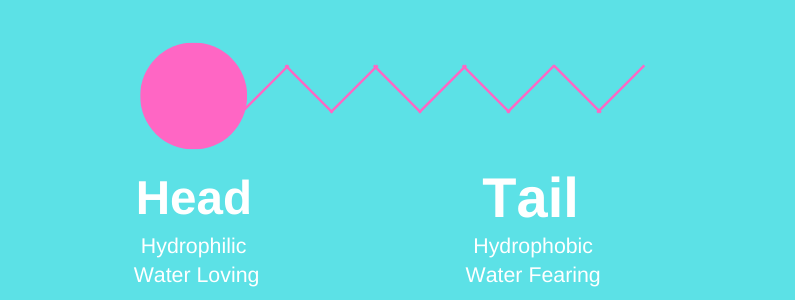
The reason why it is important to make a bubble bath this way, is the way that surfactants work. Basically, the hydrophobic (water fearing) ends of the surfactant, will not mix with water. The head of the surfactant is attracted to water (hydrophilic).
So, when you start with water, add a surfactant, then add more water, the surfactants trap a layer of water in between them, making a bubble. Think of a bubble sandwich! Or would it be a water sandwich in this example? (I’m not sure, but you get the idea!)
All bubbles are not created equal
Since we want a lot of long lasting bubbles, it is important that we are using the right ingredients. Our bubble bath is broken into 3 phases.
Phase 1 (Surfactants and Humuctant)
Surfactants
Ok, so you might be wondering what a surfactant is. The short answer, they are what makes our bubbles in this formula.
%22%20transform%3D%22matrix(4%200%200%204%202%202)%22%20fill-opacity%3D%22.5%22%3E%3Cellipse%20fill%3D%22%23464948%22%20rx%3D%221%22%20ry%3D%221%22%20transform%3D%22matrix(-11.00964%20167.0218%20-37.95739%20-2.50205%2012.8%20206.3)%22%2F%3E%3Cellipse%20fill%3D%22%23caadb7%22%20rx%3D%221%22%20ry%3D%221%22%20transform%3D%22rotate(-179.5%2093%2017.8)%20scale(54.341%2076.11408)%22%2F%3E%3Cellipse%20fill%3D%22%23b4b7b6%22%20rx%3D%221%22%20ry%3D%221%22%20transform%3D%22matrix(-21.27488%20-42.46477%2042.22856%20-21.15654%20103%20137.3)%22%2F%3E%3Cellipse%20fill%3D%22%23e6739a%22%20cx%3D%22180%22%20rx%3D%2263%22%20ry%3D%2227%22%2F%3E%3C%2Fg%3E%3C%2Fsvg%3E)
Coco Glucoside %22%20transform%3D%22matrix(4%200%200%204%202%202)%22%20fill-opacity%3D%22.5%22%3E%3Cellipse%20fill%3D%22%233d403f%22%20rx%3D%221%22%20ry%3D%221%22%20transform%3D%22rotate(169.4%204.7%20116)%20scale(43.44465%20123.32993)%22%2F%3E%3Cellipse%20fill%3D%22%23bfb0b5%22%20rx%3D%221%22%20ry%3D%221%22%20transform%3D%22matrix(51.47572%20-10.6601%2051.71076%20249.70183%20221.4%2088.7)%22%2F%3E%3Cellipse%20fill%3D%22%233c3f3e%22%20cx%3D%2283%22%20cy%3D%2220%22%20rx%3D%2243%22%20ry%3D%2248%22%2F%3E%3Cellipse%20fill%3D%22%23b7bab9%22%20rx%3D%221%22%20ry%3D%221%22%20transform%3D%22matrix(-11.50456%2041.01667%20-25.06417%20-7.03012%20100.1%20139)%22%2F%3E%3C%2Fg%3E%3C%2Fsvg%3E)
Cocamidopropyl Betaine
Cocamidopropyl Betaine – This is an amphoteric surfactant, which means that it is compatible with anionic, non-ionic and cationic surfactants.This is a clear liquid.
Coco Glucoside- Natural non-ionic surfactant that is very mild. It is known for its bubbliness and a stable bubble too. It comes from coconut oil and fruit sugar. This is a clear viscous liquid.
Humuctant
Vegetable Glycerin- I am realizing that I use this in almost everything, I love love love it. We use this in bubble bath because it is a natural moisturizer. Normally, I wouldn’t use this at such a high percentage if we were applying it directly on the skin, because it can get sticky feeling. However, in the bath it is fine to use at a higher percent as it will be diluted with water.
Phase 2 (PH Level)
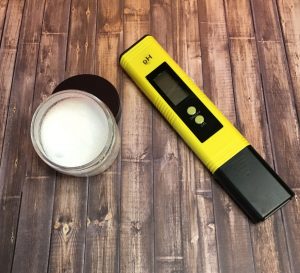
Our skin has a natural ph of about 5.5. We want to make sure that our bubble bath ph level is not too high.
Citric Acid – Citric acid is needed to balance the ph in the bubble bath. The rule of thumb when using citric acid to lower ph, is to just use a very small amount at a time. Add this to your product. Then mix it thoroughly and wait a few minutes. Then, you will test the ph again. If you need to repeat this step until you get your product that is roughly 5.5.
It is better to do this a little at a time, to ensure that you don’t lower it too much.
Phase 3 ( Preservative, Fragrance and Colorant)
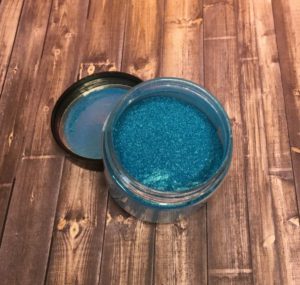
Preservative – Although we are not using and water in this formula, it is likely that water would get introduced into the product during use, so we have to use it.
Fragrance – This is completely optional. I used a berry fragrance oil that smells amazing!
Mica Powder – This is also optional, it is not going to add much coloring to your actual bath but it will add some. One of my favorite things is figuring out what color the scent should be in the homemade bubble bath.
Homemade Bubble Bath
Equipment
- Scale
- Spatula
- PH tester
- Mixing container
Ingredients
- 3.2 ounces | 40% Cocamidopropyl Betaine
- 4 ounces | 50% Coco Glucoside
- 0.56 ounce | 7% Vegetable Glycerin
Cool Down Phase
- 0.08 ounce | 1% Broad Spectrum Preservative *follow manufactures use rate
- 0.16 ounce | 2% Fragrance Oil
- Citric Acid *as needed to lower ph
- Mica Powder *as desired for coloring
Instructions
Phase 1
- Weight out all of your ingredients into separate containers.
- Pour the Coco Glucoside into a mixing container.
%22%20transform%3D%22translate(.6%20.6)%20scale(1.17188)%22%20fill-opacity%3D%22.5%22%3E%3Cellipse%20fill%3D%22%23fdf1ea%22%20rx%3D%221%22%20ry%3D%221%22%20transform%3D%22matrix(-.00872%2050.7309%20-187%20-.03214%20131.5%2033.9)%22%2F%3E%3Cellipse%20fill%3D%22%23545658%22%20cx%3D%2291%22%20cy%3D%22192%22%20rx%3D%22187%22%20ry%3D%2270%22%2F%3E%3Cellipse%20fill%3D%22%23ffa458%22%20rx%3D%221%22%20ry%3D%221%22%20transform%3D%22rotate(-177.2%204.6%209)%20scale(26.14127%2038.13045)%22%2F%3E%3Cellipse%20fill%3D%22%23b2b5b8%22%20cx%3D%2266%22%20cy%3D%2281%22%20rx%3D%22127%22%20ry%3D%2230%22%2F%3E%3C%2Fg%3E%3C%2Fsvg%3E)
- Add Cocamidopropyl Betaine in with the Coco Glucoside.
%22%20transform%3D%22translate(.6%20.6)%20scale(1.17188)%22%20fill-opacity%3D%22.5%22%3E%3Cellipse%20fill%3D%22%23fff%22%20rx%3D%221%22%20ry%3D%221%22%20transform%3D%22rotate(177.5%2067.6%2012.7)%20scale(126.74801%2041.85816)%22%2F%3E%3Cellipse%20fill%3D%22%23353637%22%20rx%3D%221%22%20ry%3D%221%22%20transform%3D%22matrix(48.49678%2077.82587%20-54.4835%2033.9511%2023.9%20207.3)%22%2F%3E%3Cellipse%20fill%3D%22%23ff9b69%22%20rx%3D%221%22%20ry%3D%221%22%20transform%3D%22matrix(28.10515%20-5.3144%208.78977%2046.48455%204.8%2028.3)%22%2F%3E%3Cellipse%20fill%3D%22%23f1f2f3%22%20cx%3D%22165%22%20cy%3D%2213%22%20rx%3D%22115%22%20ry%3D%2226%22%2F%3E%3C%2Fg%3E%3C%2Fsvg%3E)
- Mix well.
%22%20transform%3D%22translate(.6%20.6)%20scale(1.17188)%22%20fill-opacity%3D%22.5%22%3E%3Cellipse%20fill%3D%22%23d2cecf%22%20rx%3D%221%22%20ry%3D%221%22%20transform%3D%22matrix(26.00667%2082.98707%20-53.59752%2016.7965%20175.5%2016.7)%22%2F%3E%3Cellipse%20fill%3D%22%23c5c1c2%22%20rx%3D%221%22%20ry%3D%221%22%20transform%3D%22rotate(-118.6%20152.2%2059.2)%20scale(46.90717%2068.24764)%22%2F%3E%3Cellipse%20fill%3D%22%234a4647%22%20cy%3D%22194%22%20rx%3D%2286%22%20ry%3D%2286%22%2F%3E%3Cellipse%20fill%3D%22%23342a2d%22%20rx%3D%221%22%20ry%3D%221%22%20transform%3D%22matrix(-27.2805%20-31.8684%2022.96076%20-19.65523%2066.9%2015.9)%22%2F%3E%3C%2Fg%3E%3C%2Fsvg%3E)
- Add in the Vegetable Glycerin and mix thoroughly.
%22%20transform%3D%22translate(.6%20.6)%20scale(1.17188)%22%20fill-opacity%3D%22.5%22%3E%3Cellipse%20fill%3D%22%23f2f2f2%22%20rx%3D%221%22%20ry%3D%221%22%20transform%3D%22matrix(1.40012%2050.52701%20-126.4825%203.50486%20135%2023.4)%22%2F%3E%3Cpath%20fill%3D%22%233a3a3a%22%20d%3D%22M-16.2%20126.7l100.5-10.6%2015.9%20151.2L-.3%20277.9z%22%2F%3E%3Cellipse%20fill%3D%22%23727272%22%20cx%3D%22158%22%20cy%3D%22186%22%20rx%3D%2287%22%20ry%3D%2287%22%2F%3E%3Cellipse%20fill%3D%22%23a6a6a6%22%20cx%3D%22129%22%20cy%3D%2275%22%20rx%3D%22116%22%20ry%3D%2222%22%2F%3E%3C%2Fg%3E%3C%2Fsvg%3E)
Phase 2: PH Phase
- Check the ph of the bubble bath.
%27%20fill-opacity%3D%27.5%27%3E%3Cellipse%20fill%3D%22%23fff%22%20fill-opacity%3D%22.5%22%20rx%3D%221%22%20ry%3D%221%22%20transform%3D%22matrix(18.3739%2066.25416%20-56.0124%2015.53361%20164%2032.8)%22%2F%3E%3Cellipse%20fill%3D%22%234d5937%22%20fill-opacity%3D%22.5%22%20rx%3D%221%22%20ry%3D%221%22%20transform%3D%22matrix(31.05305%20-136.081%2052.89477%2012.07034%2059.1%20186.6)%22%2F%3E%3Cellipse%20fill%3D%22%23ffb26f%22%20fill-opacity%3D%22.5%22%20rx%3D%221%22%20ry%3D%221%22%20transform%3D%22matrix(-1.74845%2023.24934%20-87.72233%20-6.5971%2037.8%2012.2)%22%2F%3E%3Cellipse%20fill%3D%22%23bebfd1%22%20fill-opacity%3D%22.5%22%20rx%3D%221%22%20ry%3D%221%22%20transform%3D%22rotate(34.5%20-138.3%2080.3)%20scale(41.17401%2027.94132)%22%2F%3E%3C%2Fg%3E%3C%2Fsvg%3E)
- Add a small amount of citric acid and mix. Let stand for a few minutes.
- Re-check the ph. You want it to be about 5.5. (If need be, repeat the previous step a few times until you get the ph to 5.5).
%27%20fill-opacity%3D%27.5%27%3E%3Cellipse%20fill%3D%22%23fffffb%22%20fill-opacity%3D%22.5%22%20rx%3D%221%22%20ry%3D%221%22%20transform%3D%22matrix(-19.79221%2050.38927%20-208.33339%20-81.8305%20148%2026.4)%22%2F%3E%3Cellipse%20fill%3D%22%23575a39%22%20fill-opacity%3D%22.5%22%20rx%3D%221%22%20ry%3D%221%22%20transform%3D%22rotate(112.1%20-38%20120.2)%20scale(125.78207%2077.97146)%22%2F%3E%3Cpath%20fill%3D%22%23df847f%22%20fill-opacity%3D%22.5%22%20d%3D%22M-1.8%2013.5l-7%20114.8%20173.4-66.8z%22%2F%3E%3Cellipse%20fill%3D%22%23bed276%22%20fill-opacity%3D%22.5%22%20rx%3D%221%22%20ry%3D%221%22%20transform%3D%22matrix(19.24114%2024.71688%20-40.52138%2031.54434%20111.4%20209.5)%22%2F%3E%3C%2Fg%3E%3C%2Fsvg%3E)
Phase 3
- Add your mica powder into the container with the fragrance oil.
%27%20fill-opacity%3D%27.5%27%3E%3Cellipse%20fill%3D%22%23fff%22%20fill-opacity%3D%22.5%22%20rx%3D%221%22%20ry%3D%221%22%20transform%3D%22matrix(-4.56805%2033.62875%20-190.5311%20-25.8813%20118.7%206)%22%2F%3E%3Cellipse%20fill%3D%22%234e5251%22%20fill-opacity%3D%22.5%22%20rx%3D%221%22%20ry%3D%221%22%20transform%3D%22matrix(58.0301%20-142.19843%2059.96722%2024.47217%2020.5%20195.5)%22%2F%3E%3Cellipse%20fill%3D%22%23acacac%22%20fill-opacity%3D%22.5%22%20rx%3D%221%22%20ry%3D%221%22%20transform%3D%22matrix(72.46892%20-101.97368%2054.45666%2038.70033%20179.6%20124)%22%2F%3E%3Cellipse%20fill%3D%22%236b6b6b%22%20fill-opacity%3D%22.5%22%20rx%3D%221%22%20ry%3D%221%22%20transform%3D%22rotate(6.6%20-2303%20756.9)%20scale(232.64289%2040.16891)%22%2F%3E%3C%2Fg%3E%3C%2Fsvg%3E)
- Pour that into the bubble bath mixture and mix well.
- Add the preservative and mix again.
%27%20fill-opacity%3D%27.5%27%3E%3Cellipse%20fill%3D%22%23fff0ea%22%20fill-opacity%3D%22.5%22%20rx%3D%221%22%20ry%3D%221%22%20transform%3D%22matrix(.02355%20-47.17398%20227.96105%20.11381%20120.7%2026.6)%22%2F%3E%3Cellipse%20fill%3D%22%232c4451%22%20fill-opacity%3D%22.5%22%20rx%3D%221%22%20ry%3D%221%22%20transform%3D%22matrix(-24.73895%20-62.8035%20144.40466%20-56.8825%2065.5%20235.8)%22%2F%3E%3Cellipse%20fill%3D%22%231277ba%22%20fill-opacity%3D%22.5%22%20rx%3D%221%22%20ry%3D%221%22%20transform%3D%22matrix(-2.0608%2036.89581%20-40.6976%20-2.27314%20134.6%20202.3)%22%2F%3E%3Cellipse%20fill%3D%22%23b3b3b3%22%20fill-opacity%3D%22.5%22%20rx%3D%221%22%20ry%3D%221%22%20transform%3D%22rotate(84.8%20-9.5%2077.2)%20scale(32.50799%20260.15626)%22%2F%3E%3C%2Fg%3E%3C%2Fsvg%3E)
- Bottle and enjoy!
Some links are “affiliate links,” because I am an Amazon Associate and I earn from qualifying purchases. There is no additional cost to you, the price of the item is the same whether it is an affiliate link or not.
